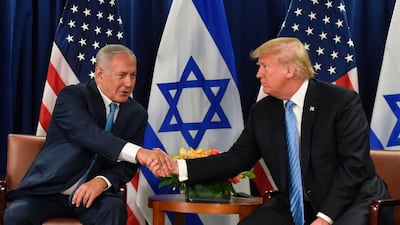Donald Trump likes to say and do "unpredictable" things. At the United Nations General Assembly meeting last week, he suddenly seemed to perform a U-turn by endorsing a two-state solution between Israel and the Palestinians. As is frequently the case with Mr Trump's pronouncements, there may be less here than meets the eye.
The issue is crucial, because his relentless attacks on the Palestinian national movement have seemed to be aimed at obliterating even the notion of Palestinian sovereignty.
Mr Trump began by vowing to achieve the "ultimate deal", but dropped the traditional American endorsement of a two-state solution. That might have been a crass marketing ploy: if you're selling a shack, call it a palace.
Mr Trump probably realised early on that a fully accomplished peace agreement between Israel and the Palestinians wasn't available in the short term, so his first instinct was to decouple the notion of "peace" from the realisation of a two-state arrangement. That way, he could market some kind of interim agreement as peace and claim his accolades and Nobel Prize.
But soon enough Mr Trump’s team, led by his son-in-law Jared Kushner, took an increasingly uncompromising, harshly anti-Palestinian approach. When Palestinians reacted angrily to the US recognition of Jerusalem as Israel's capital and Mr Trump's insistence that the issue had been "taken off the table", a campaign of maximum pressure against them was launched.
Every single Palestinian-related civilian project underwritten by Washington has been defunded. Only the Palestinian Security Forces, which Israel relies on, are still supported. In addition to Jerusalem, Mr Kushner has been trying to strip Palestinians of the refugee issue, seeking to close the UN agency responsible for Palestinian refugees and to redefine the overwhelming majority of them out of existence by removing their legal refugee status.
In case anyone didn't get the message fully, the Trump administration also closed the de facto Palestinian embassy in Washington.
It therefore became increasingly clear that the real goal of this campaign could not be the successful realisation of an interim agreement, let alone real peace. Nor could it be simply a clumsy effort to pummel Palestinians into being more compliant with a forthcoming US plan.
As the Trump administration shattered the logic and infrastructure of the Palestinian-Israeli peace process delineated in the 1993 Declaration of Principles, with its enumerated final status issues (two of which are Jerusalem and refugees), its intentions emerged as entirely destructive.
The real target of all of these measures, it seems clear, wasn't just Palestinian recalcitrance, or Israeli vulnerability on such issues as Jerusalem or refugees. Rather, it targeted the very notion of Palestinian sovereignty as a central theme in peacemaking and a consensus outcome of peace talks.
The US’s close ally, Prime Minister Benjamin Netanyahu, has long insisted that Palestinians must accept a "state minus" in any peace deal. He reiterated that in an interview after his meeting with Trump.
___________________________
Read more from Hussein Ibish:
Palestinians should counter US assault by strengthening civic society
Trump has shrugged off many cataclysms but he could be at a turning point
The Supreme Court controversy is testing the raison d'etre of Trump's presidency
___________________________
Israelis like Mr Netanyahu aren’t willing to tolerate genuine Palestinian sovereignty. They frame this refusal in military and security terms, saying they don't want to be vulnerable to Palestinian attacks, a view recently echoed by Mr Trump’s influential ambassador to Israel, David Friedman.
The real objection to Palestinian sovereignty, though, isn’t an implausible and hypothetical armed threat. It’s that a sovereign Palestinian entity could effectively limit Israel’s ambitions in the currently occupied territories, and even potentially challenge some of Israel's existing "facts on the ground". It could also use international laws and multilateral institutions to defend Palestinian rights.
Many Israelis simply aren't willing to countenance a fully sovereign, genuinely independent Palestinian entity because it would always have the potential to become a challenger to Jewish sovereignty, power and privilege in historical Palestine.
In New York last week, Mr Trump mused that he "prefers" a two-state solution without defining what that would look like, but quickly added that "if the Israelis and the Palestinians want one state − that's OK with me".
Whatever his real intentions, Mr Trump's actions have thoroughly demolished what little clarity existed in US policy and the peace process before his interventions. By trying to remove Jerusalem from the negotiations, for instance, he amplified its importance and hardened the positions of all sides.
Mr Trump may sincerely believe that he remains theoretically open to genuine Palestinian sovereignty and to functioning peace talks. But his actions have systematically, aggressively and thoroughly attacked both with impressive effectiveness.
Mr Trump also hinted he might resume aid to the Palestinians. Certainly, Palestinians should be receptive if he tries to repair the damage. They need good relations with Washington. But Mr Trump doesn't seem to understand how much his team and policies have damaged both US-Palestinian relations and the prospects for peace. Or maybe he does. It doesn’t really matter.
He certainly cannot undo the harm by making vague references to “two states”, and there’s no reason yet to take that seriously.
By now it has become almost impossible not to conclude that the real goal was not to create anything new, as Mr Trump and Mr Kushner keep boasting, but to so thoroughly destroy the existing peace process and diplomatic realities that it will be practically impossible for anyone to reconstruct them later.
Hussein Ibish is a senior resident scholar at the Arab Gulf States Institute in Washington


